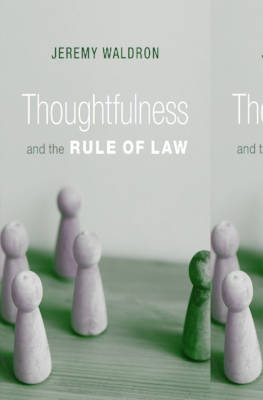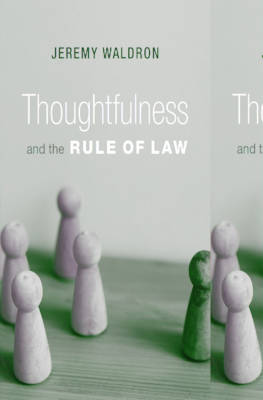
- Retrait gratuit dans votre magasin Club
- 7.000.000 titres dans notre catalogue
- Payer en toute sécurité
- Toujours un magasin près de chez vous
- Retrait gratuit dans votre magasin Club
- 7.000.0000 titres dans notre catalogue
- Payer en toute sécurité
- Toujours un magasin près de chez vous
Description
An essential study of the rule of law by one of the world's leading liberal political and legal philosophers.
The meaning and value of the rule of law have been debated since antiquity. For many, the rule of law has become the essence of good government. But Jeremy Waldron takes a different view, arguing that it is but one star in a constellation of ideals that define our political morality, ranking alongside democracy, human rights, economic freedom, and social justice. This timely essay collection, from one of the most respected political philosophers of his generation, is a brief on behalf of thoughtfulness: the intervention of human intelligence in the application of law. Waldron defends thoughtfulness against the claim that it threatens to replace the rule of law with the arbitrary rule of people. To the contrary, he argues, the rule of law requires thoughtfulness: it is impossible to apply a standard such as "reasonableness" on the basis of rules alone, and common legal activities like arguing in court and reasoning from precedents are poorly served by algorithmic logics. This rich compilation also addresses the place of law in protecting human dignity, the relation between rule of law and legislation, and whether vagueness in the law is at odds with law's role in guiding action. Thoughtfulness and the Rule of Law emphasizes the value of procedures rather than the substance or outcome of legal decisions. Challenging the view that predictability and clarity are cardinal virtues, Waldron shows that real-world controversies often are best approached using a relatively thin concept of the rule of law, together with the thoughtfulness that a legal system frames and enables.Spécifications
Parties prenantes
- Auteur(s) :
- Editeur:
Contenu
- Nombre de pages :
- 336
- Langue:
- Anglais
Caractéristiques
- EAN:
- 9780674290778
- Date de parution :
- 05-12-23
- Format:
- Livre relié
- Format numérique:
- Genaaid
- Dimensions :
- 157 mm x 236 mm
- Poids :
- 635 g

Les avis
Nous publions uniquement les avis qui respectent les conditions requises. Consultez nos conditions pour les avis.






